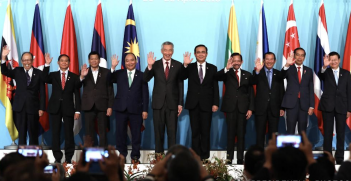Enchained to a World Departed? Australian Policy toward the Israeli-Palestinian Conflict

The two-state solution is no longer viable, and Australia must rethink its approach to Israel-Palestine in line with its evolving values and demographics. Instead of privileging one ethno-religious group, Australia should advocate for a single democratic framework ensuring equality and shared sovereignty for both Israelis and Palestinians.
The economist John Maynard Keynes once observed that when the facts changed, he changed his mind. And the facts of the Israeli-Palestinian conflict have indeed changed, to a point where a new basis for relations between Israel and the Palestinians must be created by them. They have no alternative.
For Australia, also, we need to recognise that the facts that underpinned our support for the two state approach have changed, forever. The world has changed, and so has Australia.
We were a very different country in 1947 when Australia, at the urging of H. V. Evatt, played a key part in securing the passage through the United Nations of the procedures and the resolution that enshrined the vision of two states—one Arab state, one Jewish—as the way forward.
In Australia, British race nationalism was predominant. We had a White Australia policy. Indigenous Australians were not counted as citizens. Multiculturalism was unthinkable. Women were denied equal rights with men. The six o’clock swill was integral to popular Australian male culture.
The then recent historical experience of the division of India meant the notion of partition as a solution to the Israeli-Arab conflict had a precedent. It was supported by the Jewish community, and by the churches (who with sublime imperial indifference also wanted to see Jerusalem hived off from both sides as a corpus separatum).
It was advocated by those officials who had invested their professional and intellectual energy into making the newly-established United Nations an effective instrument for the betterment of humanity. Enforced partition also rested comfortably with sympathy for Jewish suffering and popular disinterest in, and lingering antipathy toward, the Arab world arising from successive Australian wartime experiences. Arab voices were unheard.
Fast forward 75 years. Not only has the possibility of Israel and the Palestinians achieving a two-state solution disappeared for the foreseeable future, but the social and political facts underpinning Australia’s longstanding adherence to that concept are also changing.
We have established equality before the law, irrespective of ethnicity, religion or gender, as a paramount Australian value. It is of fundamental importance to our identity.
Our population now has a substantial Arab and Muslim component. Its links to Palestine and the rest of the Arab world are strong. Galvanised by the imagery of genocide in Gaza, it is articulate, vocal, and connected across much of the political spectrum.
We are witnessing a surge in antisemitism, probably linked to anger and frustration over Gaza. The argument that Israel must be supported as a Jewish state was always heavily reliant upon the fact that Jews were subject to state-sponsored persecution in Europe. Many Jewish Australians, including Holocaust survivors, could testify meaningfully to that experience.
But the legal protections and political support afforded to human rights, including those of Jews, in most western countries since 1945 call into question whether an exclusively Jewish state to protect Jews continues to be required. Indeed, in its current, dominant form as practised by Israel and its most fervent supporters, Zionism is anathema not only to its victims, but to many in the western world as well.
Especially amid the current cycle of destruction in Gaza, with the prospect of more bloodshed to come, two previous givens are no longer incontestable in Australian society: the fundamental precept of a Jewish state; and the closely associated idea that almost any level of human suffering can be justified in the name of Israel’s self-defence against its avowed enemies.
Among those from younger generations than mine, supporting (if at all) the Jewish identity of Israel should be no more or less important for Australia than the protection of the rights of both Palestinians and Israelis to live in peace and security; and, for Australia, demonstrating and upholding our respect for international law.
It is entirely reasonable for those advocating along such lines to argue that in responding to the situation in Gaza, and wider Middle East conflicts, Australia must seek to maintain consistency between the democratic values we uphold at home as intrinsic to our identity, and those we seek to defend abroad.
The raw reality is that, in the 21st century, an ethno-religious minority dominating the lives of a Palestinian majority is an anachronism. And the application of overwhelming force to preserve that anachronism in mutually degrading ways will continue to damage the interests of us all.
Having struggled to achieve equality for all within Australian society, and with no realistic prospect of a two-state solution that might otherwise provide an agreed basis for sharing the land between the Jordan River and the Mediterranean, we should not privilege the supposed rights, rather than the needs, of one ethno-religious group over another.
Our focus should now be on encouraging and assisting Israel and the Palestinians to create, within a single, democratic framework—and through an arduous, but not impossible process of bargaining and coalition-building across existing divides—a single political entity that provides for shared sovereignty and equality between Jews and Palestinians.
The two-state approach belongs to a world that has departed. Our thinking should not remain enchained to it.
Bob Bowker is Honorary Professorial Fellow at the Centre for Arab and Islamic Studies at the ANU. He is a former Australian ambassador to several Arab countries.
This article is published under a Creative Commons License and may be republished with attribution.





